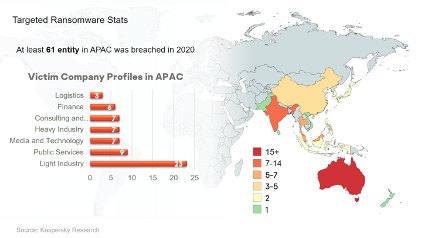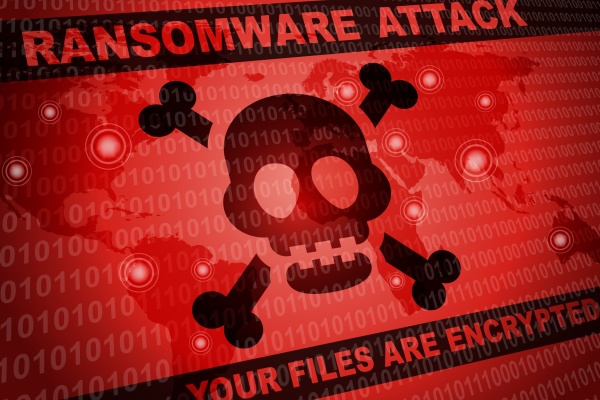Mumbai: Targeted ransomware hit 61 entities in APAC in 2020. This targeted ransomware also dubbed as ‘Ransomware 2.0’ attack goes beyond kidnapping a company’s or an organisation’s data, revealed Kaspersky’s cybersecurity expert during a virtual conference on Tuesday.
Cybercriminals groups are now utilising the increasingly valued digital reputation to force their preys to pay hefty ransom.
“At least 61 entities from the region were breached by a targeted ransomware group in 2020. Australia and India logged the highest number of incidents across APAC,” said Vitaly Kamluk, Director of Global Research and Analysis Team (GReAT) – APAC, Kaspersky.
In terms of industries, Kaspersky’s data shows that the following segments were compromised by these targeted ransomware attacks include:
- Light Industry – includes the manufacturing of clothes, shoes, furniture, consumer electronics and home appliances
- Public service
- Media and Technology
- Heavy Industry – includes oil, mining, shipbuilding, steel, chemicals, machinery manufacturing
- Consulting
- Finance
- Logistics

“Targeted ransomware has been a problem for many Asian enterprises. Over 61 companies were breached this way in Asia alone. In some cases, Maze ransomware gang claimed responsibility and published stolen data from the compromised companies,” informed Kamluk.
Maze group stands out as the most active and the most damaging of all. Formed in summer 2019, it took them about half a year to prepare and launch full scale campaign against many businesses. The first victims appeared in November 2019, when they leaked 700MB of victim’s internal data online.
Many other cases followed and within a year Maze breached at least 334 companies and organisations. This is one of the first groups which started the use of “pressure tactic”. This refers to cybercriminals threatening victims that they will publicly leak most sensitive data stolen from their compromised systems via the group’s own website.
“Pressure tactic is a serious threat to public and private organisations. This attack plays on companies’ digital reputation as it threatens to divulge data of a breached entity, compromising its security and its name at the same time,” he added.
Kamluk noted that digitalisation has birthed different pressure points for a company. Before, enterprises’ main concerns only included business continuity and, depending on the industry, government regulation.
Now, surviving in the era of digital reputation economy means that they should also be aware of business trust – with their partners and customers – as well as public opinion.
A Kaspersky survey conducted recently proved Vitaly’s points. 51% of users in APAC agree that a company’s online reputation is essential. Almost half (48%) also admitted that they avoid companies who were involved in a scandal or had received negative news coverage online, revealed the study findings.
“Maze group just announced that they are closing down, but this gang just triggered the beginning of this trend. A successful targeted ransomware attack is a PR crisis which can damage an organisation’s reputation, online and offline.”
“Financial toll aside, fixing one’s name is quite a harder task to take which is why we urge public and private entities to take their security seriously,” adds Kamluk.
To remain protected against these threats, Kamluk suggests enterprises and organisations to:
- Stay ahead of your enemy: make backups, simulate attacks, prepare action plan for disaster recovery.
- Deploy sensors everywhere: monitor software activity on endpoints, record traffic, check hardware integrity.
- Never follow demands of the criminals. Do not fight alone – contact Law Enforcement, CERT, security vendors like Kaspersky.
- Train your staff while they work remotely: digital forensics, basic malware analysis, PR crisis management.
- Follow the latest trends via premium threat intelligence subscriptions, like Kaspersky APT Intelligence Service.
- Know your enemy: identify new undetected malware on premises with Kaspersky Threat Attribution Engine.

